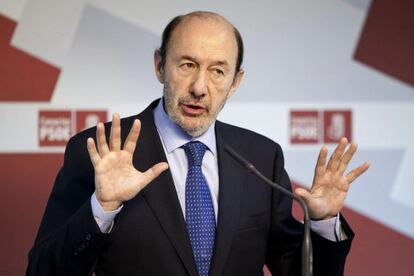Socialist leader calls on PM to face Congress over payment scandal
“What is under judgment today is the name of the prime minister of Spain,” says Rubalcaba PP secretary general "has convinced absolutely nobody,” he adds

For the second time since the Luis Bárcenas scandal began to unfold, main opposition Socialist leader Alfredo Pérez Rubalcaba has challenged Prime Minister Mariano Rajoy to appear in front of Congress to explain his role in the scandal, which is engulfing the ruling Popular Party. Rajoy should, Rubalcaba said, appear “Now. Right now.”
As the prime minister called an extraordinary party committee meeting for this Saturday, the parliamentary left was jointly condemning the ledgers published by EL PAÍS on Thursday, which purportedly show irregular payments made to high-ranking officials sourced from donations to the PP from construction companies linked to the Gürtel corruption investigation.
“What is under judgment today is the name of the prime minister of Spain,” said Rubalcaba. “He needs to come out and clarify all of this, now.”
The Socialist leader added that should the claims of side payments made to Rajoy and other leading PP officials over several years be “confirmed,” it will be “simply scandalous and implicate the prime minister.”
Were these payments made? And if so, with taxed or untaxed funds?"
In response to PP secretary general María Dolores de Cospedal’s press conference on Thursday, in which she publicly denied knowledge of any payments made by former party treasurers Bárcenas and Álvaro Lapuerta, Rubalcaba said her credibility was “zero” and that “she had convinced absolutely nobody.”
“She said that she stopped [the payments]. Everybody knew that what she was trying to say was that she had no knowledge of what had happened before she arrived [in her post]. Today she has changed [her story]; today she said that there were no payments before then. It is not very believable.”
Rajoy, Rubalcaba continued, should face Congress immediately to answer two questions: “‘Were these payments made? And if so, with taxed or untaxed funds?’ These are two simple questions. The prime minister needs to respond because we are dealing with a critical situation. It is becoming unbearable. Spain is on the front page of all the major international newspapers.”
United Left leader Cayo Lara – flanked by Congressional deputy Joan Coscubiela of the Initiative for Catalonia Greens and Chesús Yuste of the Chunta Aragonesista, the parties that together form the Plural Left parliamentary bloc – went even further: “If the data presented by EL PAÍS is confirmed, Mariano Rajoy must resign and immediately call a general election because we are facing a crisis in our democratic system.”
Two simultaneous petitions emerged from the minor opposition parties in parliament: for the creation of an investigative commission and the calling of early elections, and an emergency session in Congress to debate corruption in Spain. The governing partner of the ruling CiU coalition in Catalonia, ERC, and the Basque nationalist grouping Amaiur, backed the other parties’ position. “The two-party system is in crisis because we have already had a case of illegal financing of the PSOE, Filesa, and now the PP, starting with the Gürtel case,” said Lara.
ERC congressional spokesman Alfred Bosch said: “Not all the parties are corrupt and have their hands in the till, but all the parties have an obligation to clean up [politics] because Ali Baba’s cave exists. All corruption should be investigated, from the last councilor to the head of state.”
The PSOE, the Basque Nationalist Party and UPyD have not yet decided whether to add their signatures to the petition calling for Rajoy’s resignation and early elections.
Tu suscripción se está usando en otro dispositivo
¿Quieres añadir otro usuario a tu suscripción?
Si continúas leyendo en este dispositivo, no se podrá leer en el otro.
FlechaTu suscripción se está usando en otro dispositivo y solo puedes acceder a EL PAÍS desde un dispositivo a la vez.
Si quieres compartir tu cuenta, cambia tu suscripción a la modalidad Premium, así podrás añadir otro usuario. Cada uno accederá con su propia cuenta de email, lo que os permitirá personalizar vuestra experiencia en EL PAÍS.
¿Tienes una suscripción de empresa? Accede aquí para contratar más cuentas.
En el caso de no saber quién está usando tu cuenta, te recomendamos cambiar tu contraseña aquí.
Si decides continuar compartiendo tu cuenta, este mensaje se mostrará en tu dispositivo y en el de la otra persona que está usando tu cuenta de forma indefinida, afectando a tu experiencia de lectura. Puedes consultar aquí los términos y condiciones de la suscripción digital.








































